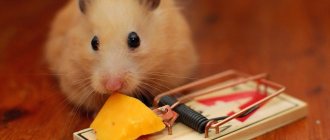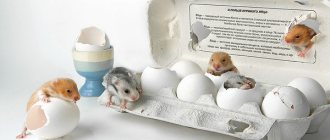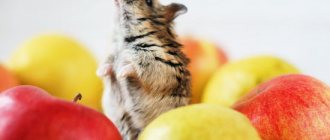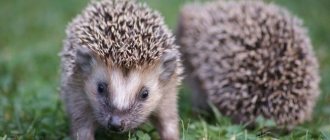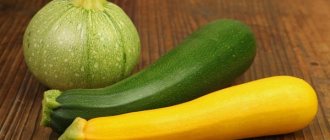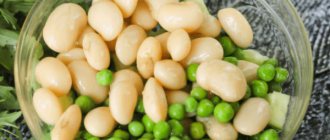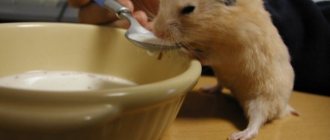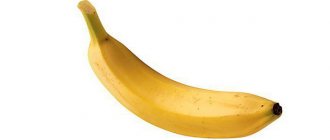The diet of your beloved animal should always be properly prepared. Normally, the body needs all the essential substances: proteins, fats, carbohydrates, vitamins, minerals. The diet of a wild hamster includes the following foods: berries, pieces of vegetables, grains, greens, larvae, residual carrion, and smaller animals. A pet needs high-quality food, so its menu includes special food mixtures, fruits, vegetables, berries, as well as fermented milk products (yogurt, cottage cheese) and other goodies.
Protein is an essential element for the body, but plant protein, unlike animal protein, will not fully saturate the body with essential amino acids. Can hamsters eat meat and fish, which are so rich in proteins? Which type of meat do you prefer?
Can hamsters eat meat?
There is a widespread belief among the owners of this animal that if you feed it meat, cannibalism will eventually manifest itself. In general, homas are herbivores. Nevertheless, they will gobble up meat products with joy.
Hamsters can have meat, but it must be fresh, lean and always boiled.
What will be harmful:
- pork;
- beef;
- fatty lamb.
Excess fat in the body negatively affects the liver of rodents, causes excess weight, and is also difficult for the stomach. An excellent alternative to meat would be a hard-boiled egg, rich in nutrients and harmless to the animal’s delicate digestive system.
Possible problems in the diet of dzhungarika
The Djungarian hamster is a tiny animal (the average weight of an adult is about 50 g). This somewhat shortens the list of what you can feed your pet: what is good for other rodents, but death for the dzhungarika. For example, almonds contain hydrocyanic acid, which is harmless for a larger pet, but can easily poison your hamster.
The second important point is that Djungarians are prone to obesity and diabetes. They should not be overfed, given sweets, or fed flour or very sweet fruits. Despite the fact that they love to eat, we put them on a strict diet.
I can handle it, I can handle it without cookies!
Can hamsters eat chicken?
Chicken fillet is even necessary in feeding a hamster, as it contains various microelements (phosphorus, iron, potassium), vitamins of various groups. The healthiest part of chicken is a good diet breast. Chicken meat will only benefit the animal.
Protein is necessary for growth, maintaining the tone of internal organs, affects the regeneration of blood cells and is aimed at the correct functioning of the body as a whole.
Chicken should be given in the morning, as protein is a quickly digestible element. Considering that hamsters are active at night, such light food is perfect for him during daytime sleep.
We store it correctly
Veterinarians sometimes hear that they fed only ready-made food from a pack, but the rodent has an intestinal disorder. Why? Follow the rules for storing the grain mixture. Damp seeds with signs of mold cause poisoning and painful conditions. And also, you need to carefully monitor the feeder when giving animal supplements - meat, eggs. If you haven't eaten it, you need to put it away so it doesn't disappear. Do not feed grass in bouquets in summer, just a little in the feeder. Hamsters drag greenery into the hole, it rots and gets dirty. A long stalk can get tangled around the paw, pinching the blood vessels until it becomes dead.
Can hamsters have sausage and frankfurters?
Sausage is a rather specific product for rodents. Human food is usually harmful to pets, but if you still decide to treat your pet, then consider the following:
- Boiled sausage is the best option for a hamster in terms of treats; it is made from lean meats, but contains a complex of spices.
- It is highly not recommended to give raw smoked sausage, as they contain a large amount of fat, starch and a lot of food additives.
- Although sausages are made from lean meat, they also contain a large amount of spices and various additives, which is completely undesirable for hamsters.
The result is that any sausage and frankfurters are harmful to the body of Djungarian and Syrian hamsters.
Has the hamster already said “thank you” to you?
Knowledge without practice is useless ballast. Right now, tell your family to stop stuffing food into the poor animal all day long. And if your hamster learns to talk, the first thing he will say to you is: “Thank you very much!”
Come back! I'll miss
Do you want to add something to the information in the article and do you know what else you can feed your rodent? Leave comments and join us on social networks. Constructive criticism is always welcome!
Can hamsters fish?
Low-fat boiled fish can be given to little gluttons two to three times a week as a protein component of the diet. If you treated the homa with chicken meat, then you no longer need to give fish, since you need to feed it with one thing containing that amount of protein.
Seafood is rich in vitamins and iodine, and also contains virtually no heavy fats, so fish is a very healthy food. You can also add cod liver and fish oil to your hamster's diet (just one drop from a pipette). And although crab sticks can be classified as seafood, they are not suitable for fat people at all due to the high content of spices and other chemicals.
Benefits of seafood for your pet:
- strengthening the immune system;
- healthy silky fur;
- protection against colds;
- maintaining visual acuity.
How to feed a Djungarian hamster
How many times a day should you feed the animal? Djungarians are nocturnal (like other hamsters), so the main meal should be in the evening. You can feed food only once a day, but it wouldn’t be a mistake to feed it twice (in this case, let’s eat 70% of the daily amount in the evening, and 30% in the morning). This is not done for gorging before bed, but so that during the day, when the animal periodically wakes up, it has something to eat - the dwarf has a very fast metabolism (an eternally hungry hamster).
An adult Djungarian hamster only needs a tablespoon of food per day (with a small heap). Even if the food quickly disappears from the bowl, this is not a reason to feed more: most likely, your pet took everything that it didn’t eat into the pantry in order to “hamster” it later. It is his instinct to stock up.
Add more rash or I’ll bite your nose off!
Don't forget to promptly remove leftover perishable foods, otherwise they will begin to rot in the pantry.
Place the bowl itself in the house as far as possible from the toilet (the hamster will determine where he will have a toilet himself, so it will not be possible to designate places for feeding and relief in advance).
Conclusion
To summarize, meat is a priority product in a hamster's diet. It is important to adhere to a few simple rules.
- Use boiled chicken more often, as this is the safest meat for the animal.
- Do not feed foods that are fatty, salty, peppery, or whose composition takes up more than five lines on the label.
- Boil lean meat and fish in a saucepan, cut into small pieces and put the cooled ones in a feeder.
- Treat your hamster to one type of protein food no more than 2-3 times a week.
Let's sum it up
Finding the right food for a hamster at home is not difficult; you just need to follow the basic rules: natural food should always be fresh and served in reasonable quantities. Products containing protein must be included in the diet daily in small quantities, alternating them with each other: cottage cheese, milk, fish, meat, eggs.
So, can hamsters eat meat? Be sure to feed it to your pet. Moderate consumption of this product will improve the condition of the coat, prevent vitamin deficiency, and have a positive effect on the general condition of the animal’s body.
Sausage is prohibited for hamsters
Can a hamster have sausage? Of course not. To make it, they use a full range of chemistry, spices and salts. Please take a look at this product. There must be fat content in it; without salt, the sausage would have no taste. Spices are out of the question. Substitutes, preservatives and flavorings make up a large portion of every cheap product. That's why hamsters can't eat it. The animal will not refuse it if offered to it. He refuses practically nothing at all. It even gnaws on wood and cages. Therefore, what your pet will eat depends only on you. Remember, proper nutrition affects not only your health, but also your life expectancy.
Cartoons often depict rodents eating cheese and sausage. Therefore, there is a stereotype that these are their favorite dishes. But that's not true. Both products are harmful. Can hamsters eat cheese? No. Can they have sausage? Also no. Remember, what you feed should not contain a lot of salts, spices, fats and chemicals. The latter may even kill the animal. Sausage can be given extremely rarely and only if it is real, of high quality and, accordingly, expensive. And that's a small piece. Anything cheap has many chemical substitutes, which can quickly lead to the death of a small organism.
Hamsters love to eat boiled meat, but salt and seasonings should be avoided. You need to choose a low-fat product (chicken, turkey). The animals will not refuse a small piece of homemade lard or shrimp.
Can hamsters eat canned fish?
Many types of fish, such as tuna and sardines, are often stored in cans. While it is convenient and completely safe for us humans to consume in this manner, this is not the case for hamsters. Canned fish is usually preserved in either brine or vegetable oil, neither of which are suitable for your hamster. Brine contains a huge amount of salt, and too much salt in your hamster's diet is a recipe for disaster. Vegetable oils can make your hamster sick and should also be avoided.
Choose fresh cooked fish instead of canned fish.
Comments from 12 Monkeys
Online store 12 Monkeys
recommends a safe and balanced diet from the Russian manufacturer Laboratorkorm. The company has been supplying food for laboratory animals to research institutes and vivariums of educational institutions for 18 years and knows all the features of feeding hamsters and rats. A balanced composition is prepared in the form of granules from crushed cereals collected during the budding phase; meadow grasses - clover, alfalfa. The food is enriched with vitamins, antioxidants, and essential amino acids.
Do hamsters like meat? How much food do they need?
Hamsters are classified as herbivores, but they love meat very much, although food consisting of dry grain mixtures, which may include oats, wheat, barley, millet, buckwheat, rolled oats and other types of cereals, is suitable for them.
For example, buckwheat is very useful for animals, as it contains large quantities of vitamins. They also love boiled soups made from cereals, and also with the addition of meat, preferably chicken. If the hamster is too young or small, it will require more meat. It all depends on how much the pet weighs. If his weight is 10-14 grams, then per day he will eat such a volume of food, including meat products, which is about 70-80% of his total body weight, sometimes the weight of food can be 100% or even more, it all depends on the mood and health of the pet. In any case, the pet will not refuse to occasionally eat meat.
Features of feeding a pregnant or lactating woman
While bearing and feeding offspring, the female Syrian hamster needs to eat heavily. During this crucial period, she requires a slightly larger amount of nutrients. A complex of vitamin and mineral supplements should also be introduced. The diet includes more fresh greens, sprouted grains and high-protein foods. Food should be as varied as possible and definitely healthy.
Veterinarians advise putting a mineral pebble (sold at any veterinary pharmacy), a piece of chalk, coal or calcium gluconate inside the cage as a treat. A pregnant or lactating female hamster usually has an increased appetite and she usually becomes very anxious when food is scarce. To avoid negative consequences for her and her offspring, it is recommended to increase the amount of feed given. It is better if there is always food in the bowl, but it must be fresh.
What to feed small hamsters
For the first four weeks of their lives, small hamsters feed exclusively on their mother's milk. There is no need to feed them additionally. Newborn hamsters left without a mother (or in the absence of milk from her) are fed with soy-based infant formula for the smallest (from birth 0+). You can also feed it with a cat milk replacer.
Once they reach the age of one month, they begin to be offered other food. The digestive system of babies is still very delicate, so the diet of adult hamsters is not suitable for them.
Regular grain food is poured into a bowl so that the kids can rummage through it and choose what they like. It is better not to give nuts, fruits and other treats for now, but to put them aside for later (until he grows up). Hamsters should be fed milk formula and porridge; you can mix steamed oatmeal or buckwheat flakes with baby puree (from various vegetables or meat). Gradually, one by one, other products are introduced: sprouted grains and young shoots, fresh herbs.


